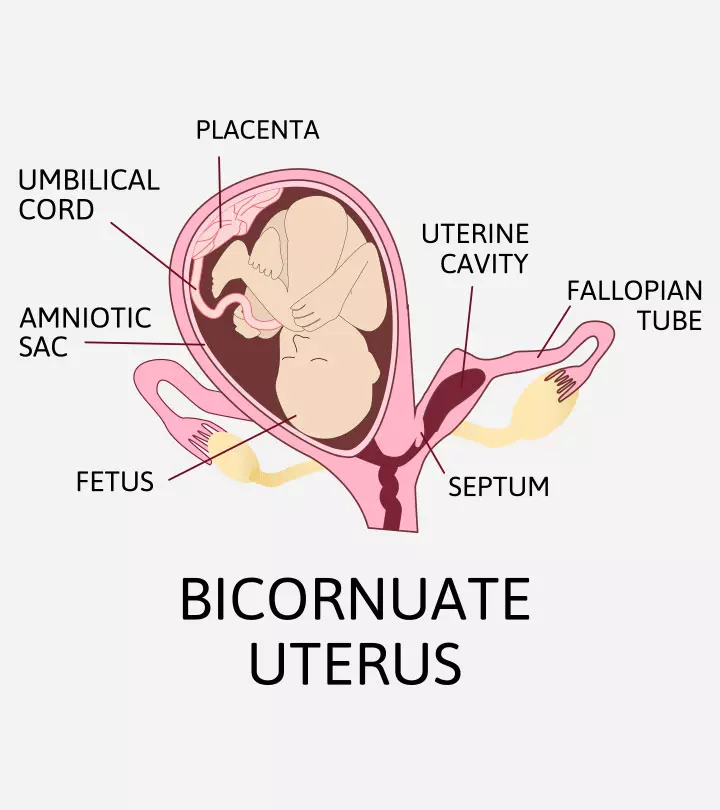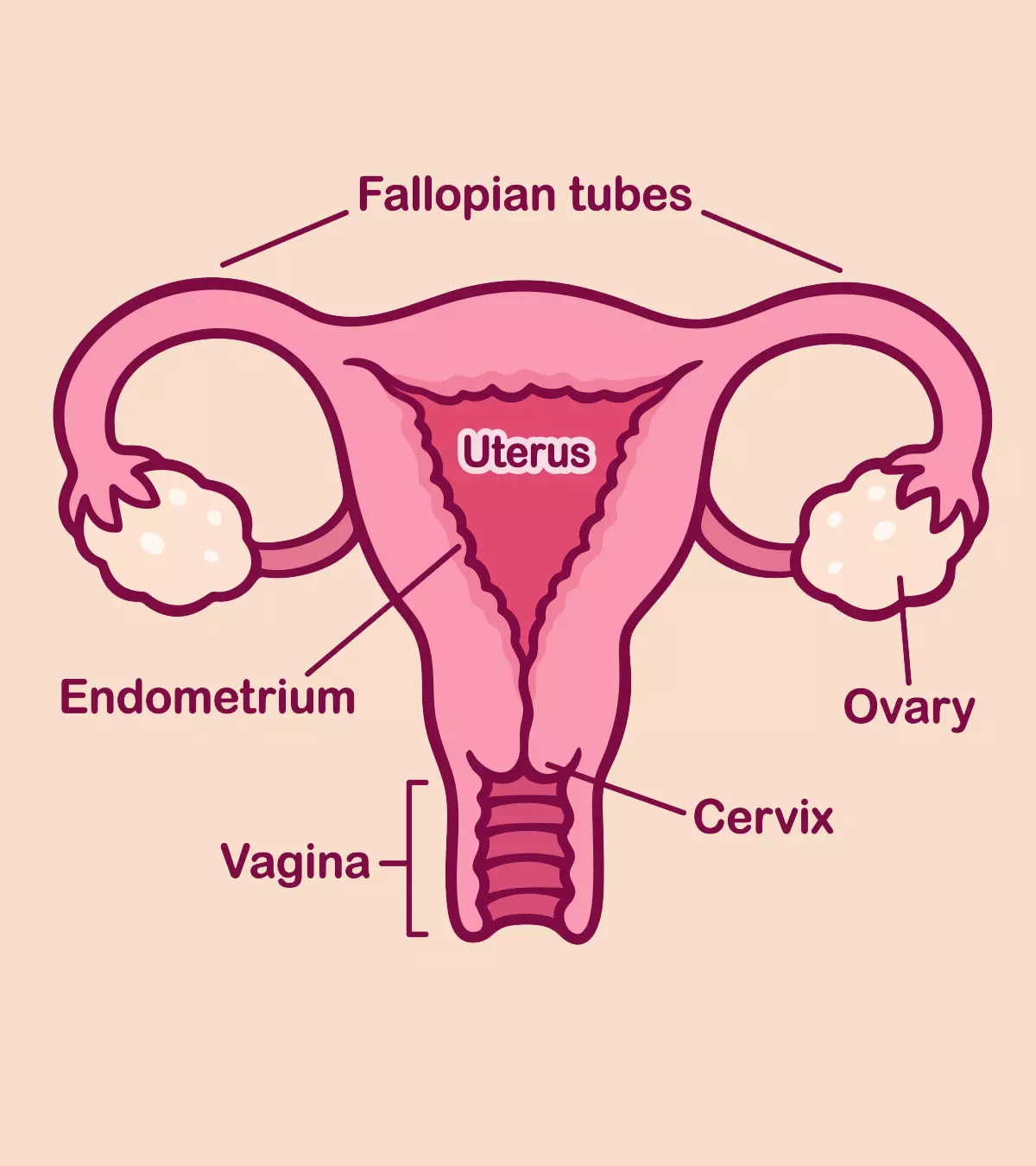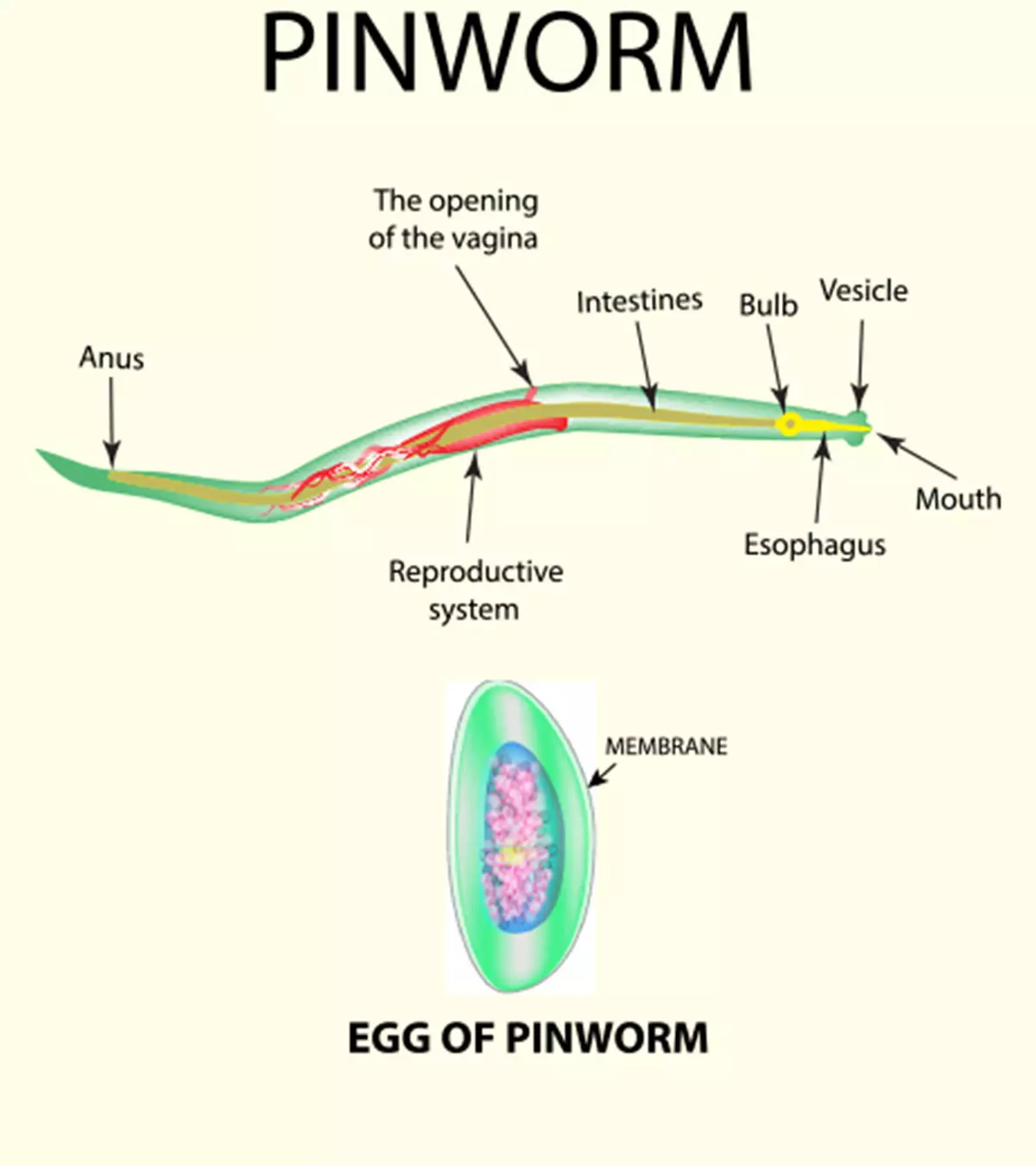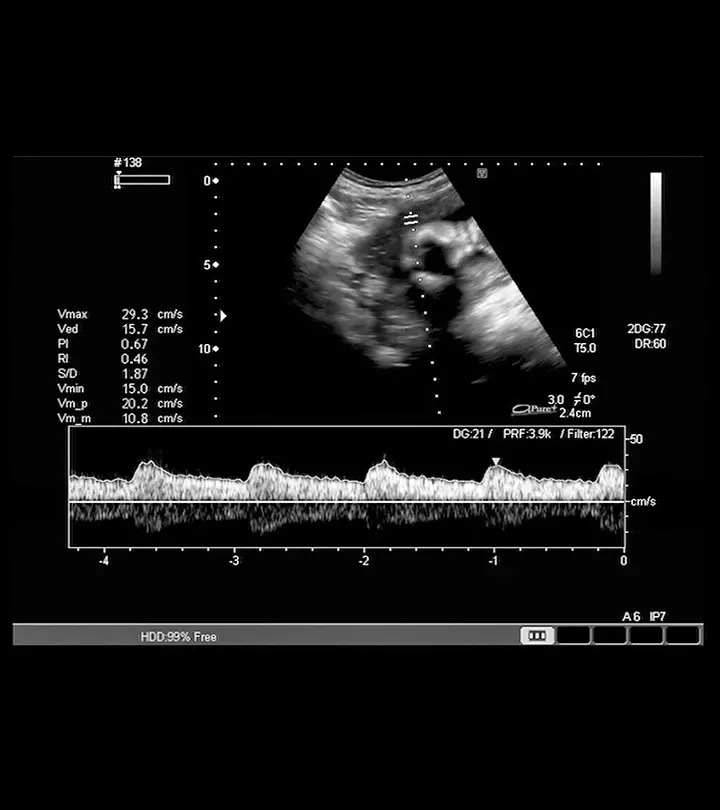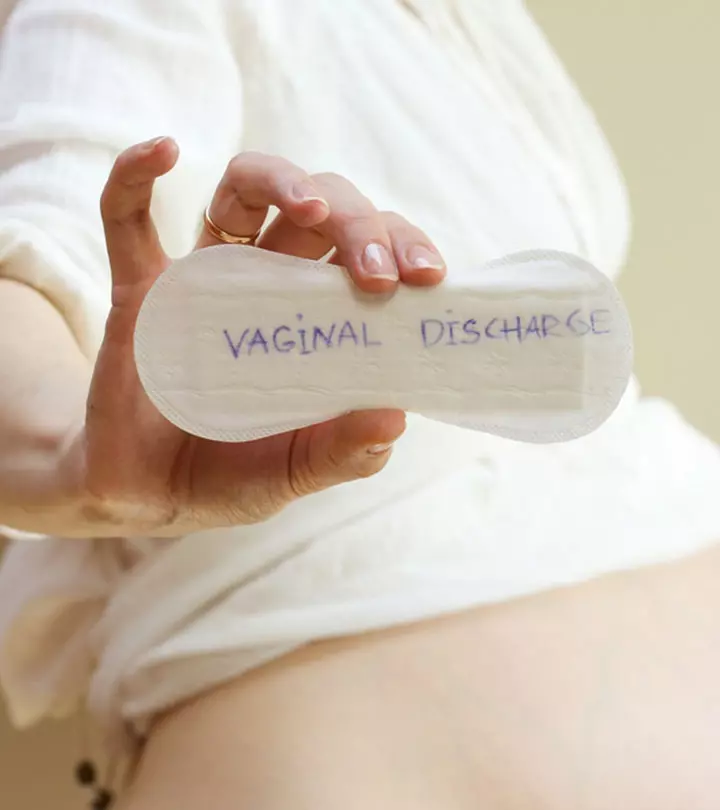
Image: Midjourney/ MomJunction Design Team
Eye rolling is a common phenomenon that many people do involuntarily. However, you may feel concerned about a possible health problem when you see a baby rolling eyes. Most babies and infants may roll their eyes usually without any underlying causes of concern. However, you may seek medical care if your baby’s eye-rolling movements become too frequent and they begin to display any signs of neurological disorders. Explore more about the possible causes, signs and symptoms, warning signs, and facts to remember about eye-rolling in babies.

Key Pointers
- Underdeveloped eye muscle control or gradually falling asleep while breastfeeding can prompt babies to roll their eyes.
- It is a normal phenomenon, but additional symptoms such as body stiffening, abnormal breathing, or convulsions may indicate a neurological issue.
- Observe the pattern and alarming signs, if any, and consult your doctor for timely diagnosis and treatment.
Why Do Babies Roll Their Eyes While Sleeping?

Babies may roll their eyes since their eye muscles and the visual system are not yet completely developed. Eyesight and control over eye muscles gradually develop in babies over time (1). According to Daniel Boyer, MD, “Babies roll their eyes because it is one of their natural reflexes. When babies stop rolling their eyes, it means that they have developed enough control over their muscles to keep their eyes focused in the same direction. This typically happens around six months.”
 Experts say
Experts sayInfographic: Normal And Abnormal Causes Of Infant Rolling Eyes
Some thing wrong with infographic shortcode. please verify shortcode syntaxEye rolling tends to happen during the transitional time between sleep and wakefulness. You may often notice eye-rolling when they fall asleep or while breastfeeding. It can be slow, repeated opening and closing, or blinking of the eyes. While breastfeeding does not cause eye-rolling in babies, most moms often observe their little ones close their eyes during nursing sessions.
Neurological disorders, head injuries, hypoglycemiaiA condition where the blood sugar level in the body is below the normal range (low blood sugar), fever, etc. may cause seizure-related eye-rolling in many babies. Younger babies may roll their eyes since they have poor eye muscle control and developing brain functions. Whereas, it could be more likely due to pathology in a ten-month-old baby who has developed reasonable control over the eye muscles.
 Quick fact
Quick factCauses Of Abnormal Eye Movements In Newborns
Babies may move their eyes in varying directions in the initial months after birth for various reasons, ranging from benign to serious medical conditions.
1. Transient disconjugate eye movements
In the initial phase, a baby’s eye tends to move independently in different directions, temporarily making eyes look divergent or convergent. This temporary condition may occur around the time the baby falls asleep or just enters a state of wakefulness and resolves with age (2). However, if the movement is persistent and does not reduce with age, the child may have a condition that requires medical attention.
2. Nystagmus
Congenital nystagmus is when the child has involuntary and uncontrolled movements in one or both eyes. These movements may be horizontal, vertical, or rotational and cause poor vision. The condition may be caused by congenital problems in the pathway between the brain and the eyes, brain injuries, brain maldevelopments or lesions, and other drug-induced reasons (3) (4) (5). However, some babies show these movements as part of natural eye development. Parents may consult a pediatric ophthalmologist to rule out any underlying problems.
 Quick fact
Quick fact3. Strabismus
Strabismus is a condition in which the child’s eyes misalign, causing abnormal or jerky movement. These movements may occur either towards the nose or away from the nose or be vertically higher or lower than the normal eye level. This condition may affect a single eye or both eyes. It is caused by weakness or palsy in one of the cranial nerves responsible for eye movement. Strabismus may lead to other eye problems such as AmblyopiaiA medical condition characterized by improper vision development during childhood in one or both eyes or lazy eye (6) (7).
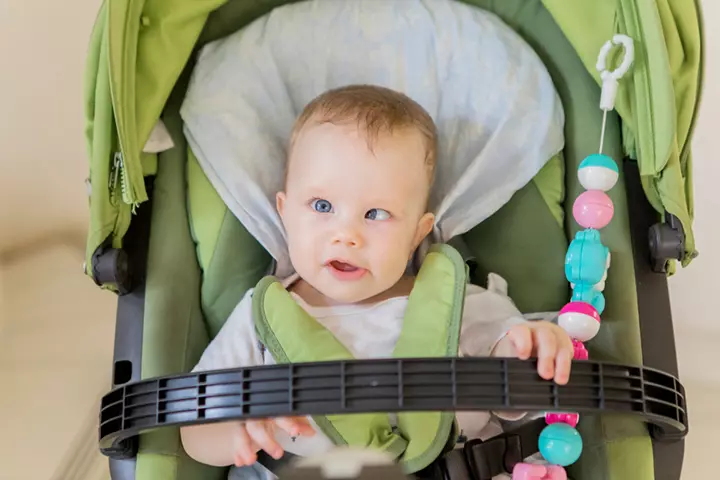
4. Other causes
A few other causes of jerky or roving eye movements include occipital lobe damage in cerebral palsyiMotor disability caused by defective brain development causing impaired movement, balance, and posture , epilepsyiA neurological condition that makes one more susceptible to recurrent seizures , encephalopathyiA condition that affects the brain's function or structure, resulting in impaired mental function and behavior , and high fever or infection-induced seizuresiA sudden aberrant electrical activity in the brain (8) (9). These conditions often occur with more pronounced symptoms, which may be noticed earlier than the abnormal eye movements.
When To Be Concerned About Eye Rolling In Babies
Eye rolling can be normal in many circumstances. There won’t be any signs of behavioral or physical changes in babies who have normal eye movements. However, pathological eye rolls may also be associated with other symptoms depending on the brain’s affected area or the problem with the visual system. Po-Chang Hsu, MD, a medical content expert at SleepingOcean.com, says, “Eye-rolling could be a sign of disorders, such as nystagmusiA term for rapid, unrestrained eye movements , strabismusiA condition where neither of the eyes points in the same direction , seizures, and cerebral palsy. However, parents should remember that eye-rolling doesn’t always mean an underlying issue. They should only be concerned if such eye movements are accompanied by symptoms, such as shivering, convulsionsiFast and rhythmic shaking, with muscles tightening and relaxing frequently , uncontrolled crying, body jerkiness, trembling, increased irritability, irregular breathing, or any unusual changes in the baby’s behavior.”
So, if you notice your baby rolling eyes often, watch out for signs of neurological disorders such as infantile spasms (West syndrome). According to the American Academy of Pediatrics (AAP), West syndrome affects one in 2,000 children, typically beginning between two and 12 months of age (10).
Some warning signs of serious illnesses that may cause eye-rolling in infants may include (11):
- Limb stiffening
- Shivering
- Irregular breathing
- Increased irritability
- Jerky body movements or convulsions
- Prolonged crying

These can be seizure symptoms in babies, and they may often require special care to avoid head injuries or other traumas during the seizure. However, Dr. Boyer clarifies, “A seizure is a medical condition that occurs when there is a sudden, brief change in how your brain’s electrical signals work. These changes can affect your body and brain’s normal functions, causing symptoms that can be mild to severe.
Rolling your eyes may not be a sign of a seizure because there is no uniform interpretation of what eye-rolling may mean. However, eye-rolling seizures can involve a person’s eyeballs.”
Eye movements not seen as normal include eyes that look only to one side and seem to be ‘stuck’ to that side or eyes jerking from side to side constantly and not just associated with falling asleep or feeding.
Discussing typical newborn reflexes and eye movements at the University of Utah Health, pediatrician Cindy Gellner, MD, explains that occasional eye-rolling during or before sleep is normal. However, if this behavior is persistent, occurs with rhythmic movements, or is accompanied by stiffness or shaking, it may indicate a seizure. In such cases, seeking immediate medical attention is crucial (12).
 Experts say
Experts sayWhat To Do If A Baby Rolls Eyes?
As a parent, you must regularly communicate with your pediatrician about your baby’s development. If you see any unusual eye movements in your baby, share your concerns during your baby’s routine check-ups or schedule an appointment.
Frequent observation is required to determine whether eye-rolling is severe or not. You may keep a log of the number of times eye-rolling occurs and any associated symptoms. Daily records of the baby’s eye-rolling habit can be useful for diagnosis.
If possible, take a recording of the event on your phone. It sometimes comes in handy when the healthcare provider is seeing the baby when the eye movements are not happening.
A seizure can be due to fever, infections, or epilepsy disorder in babies. Seek immediate medical care to diagnose the cause.
When To Consult A Doctor

Consult your baby’s pediatrician if you notice abnormal eye-rolling in your baby. If you have any concerns about their eye health or development, or suspect infantile seizures, discuss with your doctor to diagnose the causes.
Frequently Asked Questions
1. Why do babies move their eyes from side to side rapidly?
Babies may move their eyes side to side or have natural rapid eye movement while awake in the initial months after birth for diverse reasons. However, in rare scenarios, repetitive and rapid side-to-side or circular eye movements could be seen in babies with nystagmus, which may be congenitaliExisting before or since birth or acquired (3).
2. Do newborns have weird eye movements?
Yes, sometimes a newborn may display various eye movements, such as rolling or rotating their eyes. Moreover, in some cases, you may notice that your baby’s eyes may seem crossed, squinted, or atypical during the first three months after birth (13). Babies may stare or gaze with wide eyes until they develop a proper field of vision. Though this could be viewed as normal, you may consult a doctor if you persistently suspect any abnormalities in your baby’s eye movements.
3. What does it mean when a child’s eyes roll back?
Babies may roll their eyes back when they are sleepy or falling asleep. However, if you notice other symptoms (such as fever, increased heart rate, or breathing difficulties) with their eyes rolling to the back or side, they may be experiencing a febrile or tonic seizure. Such symptoms may need immediate medical attention (14) (15).
4. Can teething cause a baby to roll their eyes?
There is no evidence to suggest that teething causes eye-rolling in babies. Hence, if you notice unusual eye movements, such as eye-rolling in your baby during the teething phase, consult a physician for guidance to rule out any underlying issues.
5. How can I help my baby improve eye coordination?
Although an infant’s vision develops gradually after birth, you can support their visual development by adding simple activities to their daily routine. These include offering brightly colored toys within reach, hanging mobiles in their crib, feeding them from both sides, frequently changing their crib environment, and encouraging them to track moving objects with their eyes (1).
Eye rolling in babies may not always be serious. You may find them rolling their eyes when they are sleepy or breastfeeding. So, the behavior may be a transition phase between sleep and wakefulness. However, eye rolling might also be seizure-related. It may sometimes indicate head injuries, neurological disorders, or hypoglycemia. It may also indicate poor eye muscle control or still-developing brain functions. Irrespective of the cause, the condition should not be ignored. If they exhibit symptoms such as shivering, limb stiffening, or irritability, consult your doctor for treatment options.
Illustration: Baby Rolling Eyes: Causes Symptoms And When To See A Doctor

Image: Stable Diffusion/MomJunction Design Team
Is it normal that my newborn baby often rolls her eyes and shakes? Alleviate your worries by watching this video, which provides valuable insights into this behavior and the treatment you can look out for.
References
- Infant Vision: Birth to 24 Months of Age; American Optometric Association.
https://ebiz.aoa.org/sso/login.aspx?vi=7&vt=80d519bd73315856d731846f4f396475cffc77858254a91d1b4d67089591d169d1b894aec36d9f383959f01f1c28b189753d366356c0a56e153c0e4fe083a421785a486783af34b866899d6b0261390ccc3ecd35fc582d9caa8590f14c4432ae&DPLF=Y?sso=y - Dysconjugate Eye Movements; Stanford Medicine.
https://med.stanford.edu/newborns/professional-education/photo-gallery/eyes.html#dysconjugate_eyemovements - Nystagmus; NHS Foundation Trust.
https://www.gosh.nhs.uk/medical-information-0/nystagmus/#:~:text=It%20can%20also%20be%20called - Nystagmus in Babies & Children; American Academy of Pediatrics.
https://www.healthychildren.org/English/health-issues/conditions/eyes/Pages/nystagmus-in-babies-and-children.aspx - D. Osborne et al.; (2019); Supranuclear eye movements and nystagmus in children: A review of the literature and guide to clinical examination interpretation of findings and age-appropriate norms; NCBI.
https://pmc.ncbi.nlm.nih.gov/articles/PMC4708628/ - Lazy Eye (Amblyopia); American Academy of Pediatrics.
https://www.healthychildren.org/English/health-issues/conditions/eyes/Pages/Amblyopia-Lazy-Eye.aspx - What Is Strabismus And How Common Is It?; American Association for Pediatric Ophthalmology & Strabismus.
https://aapos.org/glossary/strabismus - Cerebral Palsy and Vision Problems; Birth Injury Justice Center.
https://www.childbirthinjuries.com/blog/cerebral-palsy-vision-problems/ - Neonatal seizures; UCSF Benioff Children’s Hospital.
https://www.ucsfbenioffchildrens.org/conditions/neonatal-seizures - Infantile Spasms: Symptoms, Causes & Treatment
https://www.healthychildren.org/English/health-issues/conditions/seizures/Pages/Infantile-Spasms-What-Parents-Need-to-Know.aspx#:~:text - Infantile Spasms Symptoms and Diagnosis; The University of Pittsburgh Medical Center
https://www.chp.edu/our-services/brain/neurology/epilepsy/types/syndromes/infantile-spasms/symptoms-diagnosis - Basics: Newborn Reflexes.
https://healthcare.utah.edu/the-scope/kids-zone/all/2025/07/basics-newborn-reflexes - Looking at Your Newborn: What’s Normal; Kids Health.
https://kidshealth.org/en/parents/newborn-variations.html - Is It Normal for a Newborn’s Eyes to Roll Back in Their Head?; Wonder baby.
https://www.wonderbaby.org/articles/newborns-eyes-roll-back - Seizures-Generalized; Nationwide Children’s Hospital.
https://www.nationwidechildrens.org/conditions/seizures-generalized#:~:text=Tonic%2Dclonic%20Seizures&text=At%20the%20start%20of%20the - Vision Development: Newborn to 12 Months.
https://www.aao.org/eye-health/tips-prevention/baby-vision-development-first-year - Early detection of seizures in infants crucial to brain development; University of Chicago Medicine.
https://www.uchicagomedicine.org/forefront/pediatrics-articles/early-detection-of-seizures-in-infants-crucial-to-brain-development
Community Experiences
Join the conversation and become a part of our nurturing community! Share your stories, experiences, and insights to connect with fellow parents.
Read full bio of Dr. Wayne Hough
- Dr. Daniel Boyer is a practicing Doctor of medicine at Carabobo Football Club, Dallas, Texas. He did his BS from Liceo Carabobo and MD from Carabobo’s University.
 Dr. Daniel Boyer is a practicing Doctor of medicine at Carabobo Football Club, Dallas, Texas. He did his BS from Liceo Carabobo and MD from Carabobo’s University.
Dr. Daniel Boyer is a practicing Doctor of medicine at Carabobo Football Club, Dallas, Texas. He did his BS from Liceo Carabobo and MD from Carabobo’s University. 
Dr. Po-Chang Hsu is a medical doctor and medical content expert. He received his medical degree from Tufts University School of Medicine in Boston in 2016. Previously, he did a master’s degree at Harvard University and wrote a thesis on neuroimaging in schizophrenia patients at Brigham and Women’s Hospital. He currently works at Alpas Wellness.
Dr. Po-Chang Hsu is a medical doctor and medical content expert. He received his medical degree from Tufts University School of Medicine in Boston in 2016. Previously, he did a master’s degree at Harvard University and wrote a thesis on neuroimaging in schizophrenia patients at Brigham and Women’s Hospital. He currently works at Alpas Wellness.
Read full bio of Dr Bisny T. Joseph
Read full bio of Rohit Garoo
Read full bio of Shinta Liz Sunny








